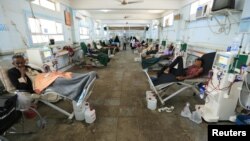The charity Doctors Without Borders says the medical and health needs of the Yemeni population are being overshadowed and neglected by the almost single-minded focus on a looming famine in the country.
Doctors Without Borders Program Manager Charles Gaudry has just returned from three weeks in Yemen. He said he was particularly struck by the extent of the needs of the population, which is paying the highest cost of more than three years of war.
He said they are victims of direct violence with thousands killed and wounded by airstrikes, shootings and shelling.
While this has taken a heavy toll on civilian lives, he said the indirect consequences of war are even greater. For example, he said more than 2,000 people died from the huge cholera epidemic that swept the country last year.
"But there are a number of others relating to all the hospitals that have closed or have seen their services drastically reduced because of not being able to pay their staff, no longer getting supplies," he said. "So, these have disrupted maternal services.These are hospitals that no longer have a surgeon."
Gaudry said more people are dying from diseases and lack of health care than they are from the war itself — and there is no support for basic health services.
He said he does not minimize U.N. warnings that millions of people in Yemen may be on the verge of famine. But he noted that many other humanitarian and health needs are not being addressed because of all the attention being placed on food assistance.
"Things need to work for the food assistance, which is necessary today to come in," he told VOA. "And, so it is important, and it is a way to raise the attention on the situation to make sure that this is going to work. But it cannot monopolize the debate on what is needed in terms of humanitarian assistance and medical in particular."
Doctors Without Borders runs a huge operation in Yemen. Its staff of more than 2,200 works in 12 hospitals and health centers across the country and provides support to more than 20 hospitals or health facilities across 11 governorates.
Since the war began in March 2015, the international charity has treated more than 1.6 million people for war related injuries, diseases, chronic illnesses and has performed surgical interventions.




